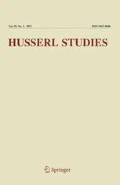Abstract
Whether Husserl is a conceptualist has been heatedly debated among contemporary Husserl scholars. The present article intends to join the debate by asking the question of how, in the Husserlian context, intuitive acts fulfill signitive ones. On the one hand, those who take Husserl to be a conceptualist hold the content-identity theory, arguing that intuitive act and signitive act have the same content, so that the former can fulfill the latter. On the other hand, the non-conceptualists defend the object-identity theory and claim that it is the identity of object of intuitive and signitive act that makes fulfillment possible. On the basis of a careful reading of the sixth investigation of Husserl’s Logical Investigations, the article proposes a dynamic content-identity theory, in which the identity of content does not mean that intuitive act and signitive act have the identical content accidentally, but rather, in the dynamic fulfillment process, the intuitive act obtains the content that overflows into it from the signitive act, so that the two acts have the identical content. And this article shows how the dynamic content-identity theory places Husserl in the conceptualist camp while avoiding certain difficulties of either plain content-identity theory or object-identity theory.
Similar content being viewed by others
Notes
This debate starts explicitly with McDowell’s Kant interpretation and his criticism of non-conceptualism in Mind and World (1994). Nevertheless, this does not mean that there had been no discussion of similar issues before. In fact, the famous and lasting debate on Husserl’s notion of “noema” is closely related to the controversy over “conceptualism/non-conceptualism,” although the terms are not explicitly mentioned. See Mulligan (1995), Cobb-Stevens (1990), Dreyfus (1982), Smith and McIntyre (1982).
Barber (2008, p. 95) believes that Husserl’s genetic phenomenology can provide horizons as “surplus contents” to supplement McDowell’s conceptualist holism, while Hopp presents “a modified version of Husserl’s theory of fulfillment” as “the best available account of how perceptual and other intuitive experiences relate to thoughts,” including “how nonconceptual contents can stand in reason-giving relations with conceptual states like belief and judgment” (Hopp 2011, p. 189–90).
For instance, Mooney tries to “show that this working downwards runs with a much clearer commitment to conceptualism” (2010, p. 20). By contrast, Hopp claims that “there is some evidence that Husserl, in his later writings, moved toward an account along these lines and away from the conceptualism characteristic of his earlier work” (2008, p. 241, fn. 64).
McDowell might agree to Sellars’ “ex post facto justifications” (in Brandom’s words 1998, p. 376) when he insists that “Jones now knows, thus remembers, that these particular facts did obtain. It does not require that it be correct to say that at the time these facts did obtain he then knew them to obtain” (Sellars 1997, p. 77).
References
Barber, M. D. (2008). Holism and horizon: Husserl and McDowell on non-conceptual content. Husserl Studies, 24(2), 79–97.
Bernet, R. (2003). Desiring to know through intuition. Husserl Studies, 19, 153–166.
Brewer, B. (2005). Perceptual experience has conceptual content. In M. Steup & E. Sosa (Eds.), Contemporary debates in epistemology. Malden: Blackwell.
Cobb-Stevens, R. (1990). Husserl and analytic philosophy. Dordrecht: Kluwer Academic Publishers.
Davidson, D. (1986). A coherence theory of truth and knowledge. In E. LePore (Ed.), Truth and interpretation: Perspectives on the philosophy of Donald Davidson. Oxford: Basil Blackwell.
Doyon, M. (2011). Husserl and McDowell on the role of concepts in perception. The New Yearbook for Phenomenology and Phenomenological Philosophy, 11, 42–74.
Dreyfus, H. L. (1982). Husserl’s perceptual noema. In H. L. Dreyfus (Ed.), Husserl, intentionality, and cognitive science. Cambridge and London: The MIT Press.
Hopp, W. (2008). Husserl on sensation, perception, and interpretation. Canadian Journal of Philosophy, 38(2), 219–246.
Hopp, W. (2009). Conceptualism and the myth of the given. European Journal of Philosophy, 17, 363–385.
Hopp, W. (2010). How to think about nonconceptual content. The New Yearbook for Phenomenology and Phenomenlogical Philosophy, 10(1), 1–24.
Hopp, W. (2011). Perception and knowledge: A phenomenological account. Cambridge: Cambridge University Press.
Husserl, E. (1980). Ideas pertaining to a pure phenomenology and to a phenomenological philosophy. Third book: Phenomenology and the foundations of the scienes. T. E. Klein and W. E. Pohl (Trans.). The Hague: Martinus Nijhoff Publishers.
Husserl, E. (2001a). Logical investigations. Volume 1. J. N. Findlay (Trans.), with a new Preface by Michael Dummett, and edited with a new introduction by Dermot Moran. London: Routledge.
Husserl, E. (2001b). Logical investigations. Volume 2. J. N. Findlay (Trans.), with a new Preface by Michael Dummett, and edited with a new introduction by Dermot Moran. London: Routledge.
Husserl, E. (2008). Introduction to logic and theory of knowledge. C. O. Hill (Trans.). Dordrecht: Springer.
Kukla, R. (2000). Myth, memory and misrecognition in Sellars’ Empiricism and the philosophy of mind. Philosophical Studies, 101, 161–211.
McDowell, J. (1994). Mind and world. Cambridge, MA: Harvard University Press.
McDowell, J. (2009). The engaged intellect: Philosophical essays. Cambridge, MA: Harvard University Press.
Mooney, T. (2010). Understanding and simple seeing in Husserl. Husserl Studies, 26, 19–48.
Mulligan, K. (1995). Perception. In B. Smith & D. W. Smith (Eds.), The Cambridge companion to Husserl. Cambridge: Cambridge University Press.
Sellars, W. (1997). Empiricism and the philosophy of mind. Cambridge, MA: Harvard University Press.
Smith, D. W., & McIntyre, R. (1982). Husserl and intentionality: A study of mind, meaning, and language. Dordrecht: D. Reidel.
Acknowledgements
I am particularly grateful to Wenjing Cai for her insightful comments and careful proofreading. I also want to thank Steven Crowell and an anonymous referee for their helpful suggestions.
Author information
Authors and Affiliations
Corresponding author
Additional information
Publisher's Note
Springer Nature remains neutral with regard to jurisdictional claims in published maps and institutional affiliations.
Rights and permissions
About this article
Cite this article
Zheng, P. Is Husserl a Conceptualist? Re-reading Husserl’s Sixth Logical Investigation. Husserl Stud 35, 249–263 (2019). https://doi.org/10.1007/s10743-019-09247-5
Published:
Issue Date:
DOI: https://doi.org/10.1007/s10743-019-09247-5


